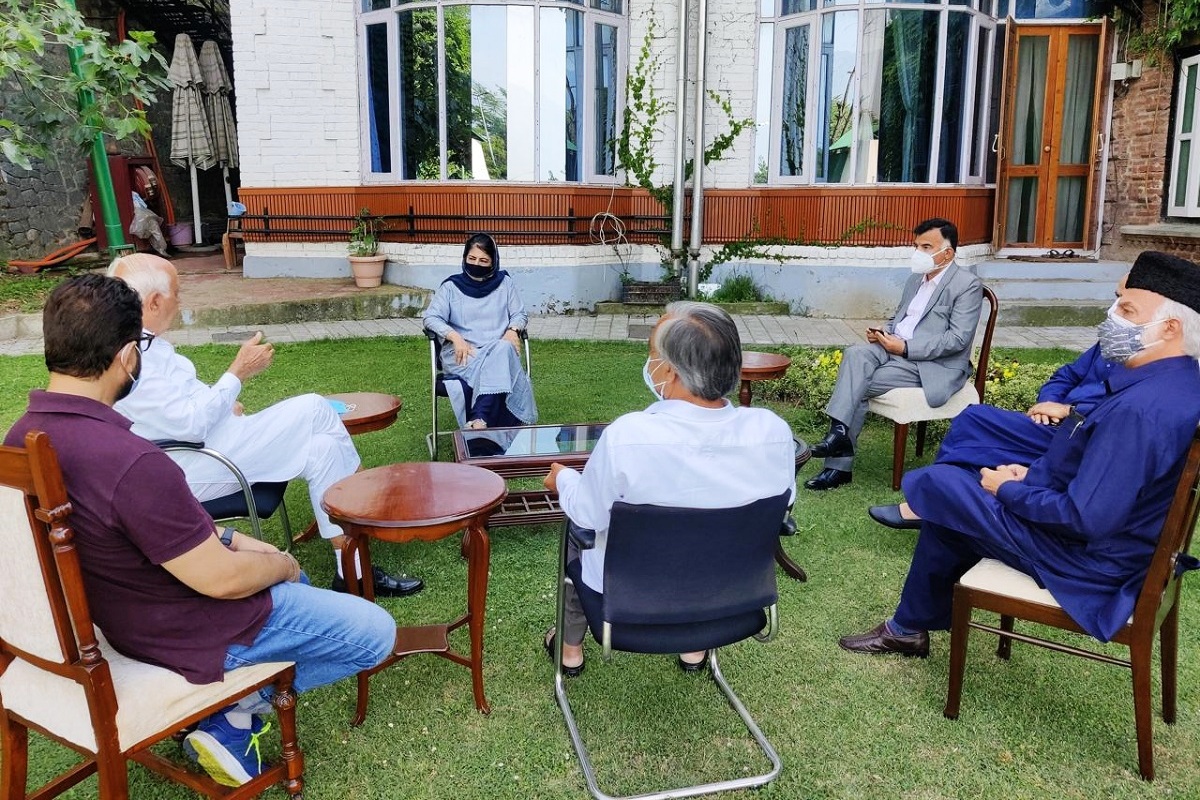Stage set for tomorrow’s polling in high profile Udhampur LS seat amid high security
Jammu and Kashmir has five Lok Sabha constituencies and each one will go to polls in separate phases because of security reasons.
This is almost two years after the abrogation of Article 370 by the Modi government that such hectic activity was being witnessed among all political parties of J&K.

(Image: Twitter/@TZM_DAR)
Political activity has warmed up in Jammu and Kashmir after Lieutenant Governor Manoj Sinha is learnt to have discussed the delimitation issue with the Home Minister Amit Shah during his recent visit to New Delhi and the Delimitation Commission asking deputy commissioners of all 20 districts of the union territory to share data pertaining to electorates and other compositions in their respective districts.
This is almost two years after the abrogation of Article 370 by the Modi government that such hectic activity was being witnessed among all political parties of J&K.
The Peoples Alliance for Gupkar Declaration (PAGD) has reactivated itself and has convened a meeting of leaders of its constituents on Wednesday evening at the residence of PDP chief Mehbooba Mufti. The National Conference chief Dr Farooq Abdullah and his son Omar Abdullah will also attend the meeting. The CPI(M) leader Mohammad Yousuf Tarigami is among the leaders participating in the crucial meeting.
Advertisement
The recent meeting of Sinha with Amit Shah and home secretary Ajay Kumar Bhalla has triggered speculations and it was being expected that the commission that had kept its further meetings on hold after February due to the Covid pandemic would hold its sittings in J&K soon. Chief Secretary Arun Kumar Mehta, Intelligence Bureau (IB) chief Arvind Kumar, Director General of Police (DGP) Dilbag Singh and DGP CID Rashmi Ranjan Swain among others were present in the meetings with Shah and Bhalla.
The BJP, Congress, PDP, Peoples Conference, J&K Apni Party, Panthers Party and other parties have started working out their strategy on the issue.
There was an expectation that the National Conference might reconsider its decision of boycotting the meetings of the delimitation commission. An indication of the National Conference leadership softening its stand on the issue came on Tuesday when while addressing party leaders, Dr Farooq Abdullah said he was not against the delimitation of constituencies in J&K but was opposed to the method adopted that was not in tandem with the procedure. “We will uphold the interests of the people at all costs in every forum”, he stressed.
The commission held its first meeting on J&K on 18 February at New Delhi but the NC MPs Farooq Abdullah, Hasnain Masoodi and Mohammad Akbar Lone, who are associate members of the commission, boycotted the meeting describing it an “unconstitutional” exercise. They said that the Jammu and Kashmir Reorganisation Act under which the commission has been set up stands challenged in the Supreme Court.
Before 5 August 2019 when the Assembly was dissolved, J&K had 111 seats including 24 reserved for Pakistan occupied Jammu and Kashmir (PoJK), and elections were held for 87 seats. With the creation of Ladakh as a separate Union Territory after being split from J&K, four seats were reduced in the Assembly that is left with 83 seats. In the previous Assembly, Kashmir had 46 seats, Jammu 37, and Ladakh 4.
The delimitation commission headed by Retired Supreme Court Judge Justice Ranjana Prakash Desai was constituted on 6 March 6 2020 for a period of one year to delimit the constituencies in Jammu and Kashmir.
The NC seniors are learnt to have advised against boycotting the commission as the party would be held responsible of having run away from the sensitive issue. The party should put its viewpoint forcefully before the commission, they said.
Meanwhile, describing the commission’s letter to all DCs of J&K 15 months after its constitution seeking basic details regarding electorates etc as a cruel joke with the people of the erstwhile state, Harsh Dev Singh Chairman, J&K National Panthers Party and a former Minister said that the casual approach of the commission has completely been exposed as the commission does not have even the basic information regarding the number of voters, topography and composition of districts and Assembly constituencies which is being sought now.
Advertisement